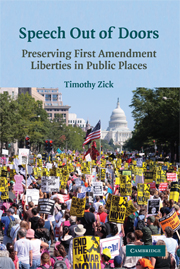Book contents
- Frontmatter
- Contents
- List of Figures
- Preface
- Acknowledgments
- SPEECH OUT OF DOORS
- 1 Introduction: The Geography of Expression
- 2 The Expressive Topography and Public Liberties
- 3 Embodied Places
- 4 Contested Places
- 5 Non-Places
- 6 Inscribed Places
- 7 Militarized Places
- 8 Places of Higher Learning
- 9 Networked Public Places
- Epilogue
- Index
- References
3 - Embodied Places
Published online by Cambridge University Press: 05 June 2012
- Frontmatter
- Contents
- List of Figures
- Preface
- Acknowledgments
- SPEECH OUT OF DOORS
- 1 Introduction: The Geography of Expression
- 2 The Expressive Topography and Public Liberties
- 3 Embodied Places
- 4 Contested Places
- 5 Non-Places
- 6 Inscribed Places
- 7 Militarized Places
- 8 Places of Higher Learning
- 9 Networked Public Places
- Epilogue
- Index
- References
Summary
We begin our examination of the expressive topography with embodied places. These are places that we actually take with us as we traverse the expressive topography. Social scientists generally refer to this type of place as one's “personal space.” Embodied place is critical to some of the most traditional forms of public expression – begging, counseling, proselytizing, soliciting, petitioning, and polling. Embodied places are often sites of high tension and uncomfortable exchange. Erving Goffman has described this as “the space surrounding an individual where within which an entering other causes the individual to feel encroached upon, leading him to show displeasure and sometimes to withdraw.”
Sociologists and legal scholars have likened embodied place to an “invisible boundary surrounding the person's body,” a “bubble,” a “shell,” and “breathing room.” Embodied places are somewhat unique in that we “own” them; we live and experience this sort of place intimately and can readily detect intrusions upon it. Given the discomfort that often accompanies intrusions upon embodied place, as well as the increasing regard for privacy and tranquility, it is not surprising that efforts to regulate or prevent access have been relatively common. Consider the following recent examples:
The enactment of “bubble” restrictions prohibiting abortion clinic “sidewalk counselors” from approaching within a specified number of feet from clinic patrons for the purpose of counseling them or advocating life.
The arrest of a Colorado man on harassment and assault charges subsequent to his approaching Vice President Dick Cheney and stating that the administration's policies in Iraq were “reprehensible.”
[…]
- Type
- Chapter
- Information
- Speech Out of DoorsPreserving First Amendment Liberties in Public Places, pp. 65 - 104Publisher: Cambridge University PressPrint publication year: 2008
References
- 1
- Cited by



